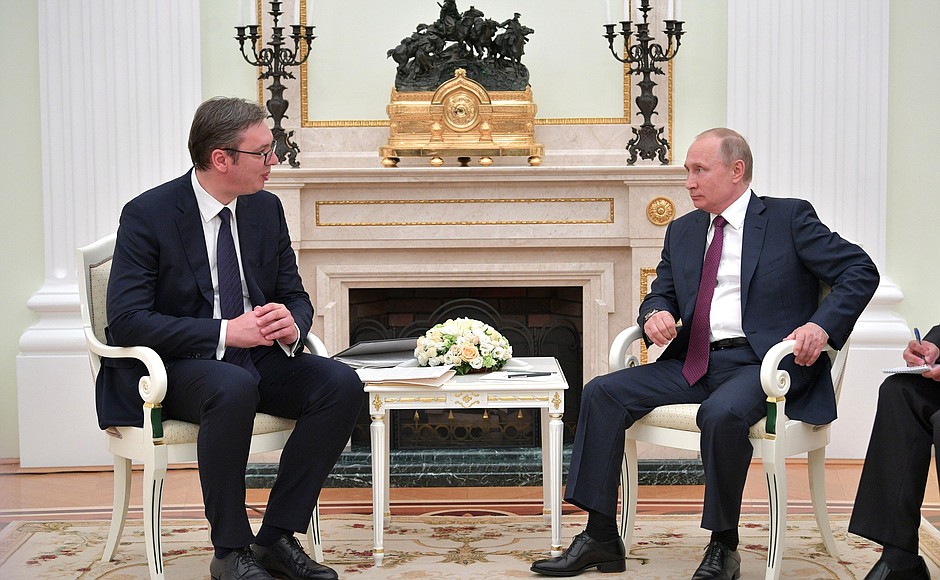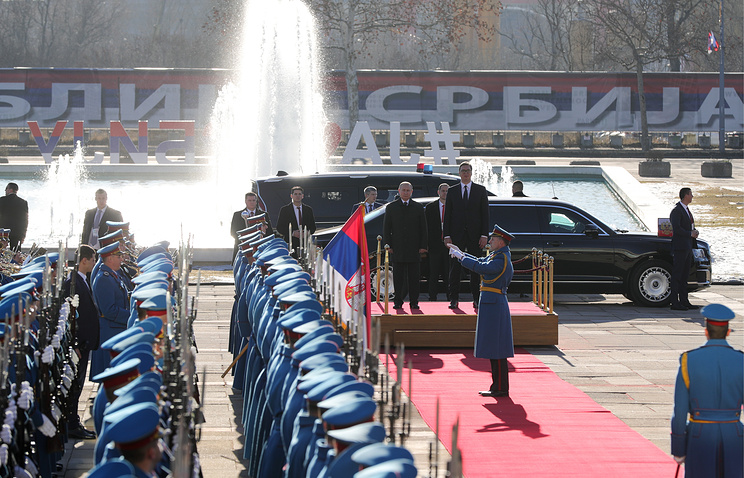January 12, 2019 - I suspect these protests were arranged by NATO allies and were assembled right after President Vucic met with President Putin in Moscow last May 8th? Vucic has stated, "
Serbia will preserve its independence. Serbia will preserve its military neutrality and is not going to become a member of NATO or any other military alliance."
Vucic further stated, "On behalf of Serbian citizens, I would like to thank you for the support that you have always granted Serbia in times of trial."
"As you know, nothing is less enduring in international relations than gratitude, and I would like to thank you once again for what you did in 2015 when you literally saved the Serbian people, that have been one of the most suffering nation during the past century, from the stigma of genocide by vetoing the UN British resolution."
"I would like to assure you that the Serbian people will never forget what you have done.
You (Russia) have protected Serbia’s territorial integrity and sovereignty many times."
President Putin is also scheduled to visit Serbia next Thursday.
May 8, 2018 The Kremlin, Moscow
Meeting with President of Serbia Aleksandar Vucic
January 12, 2019 - Protests against Serbia's President Vucic enter sixth week
Protests against Serbia's President Vucic enter sixth week | Reuters
Thousands of Serbians protested in Belgrade on Saturday against President Aleksandar Vucic and his Serbian Progressive Party (SNS), making demands including media freedom, an end to attacks on journalists and opposition figures, and no secret treaty with Kosovo.
Demonstrators march during a protest against Serbian President Aleksandar Vucic and his government in central Belgrade, Serbia, January 12, 2019. REUTERS/Djordje Kojadinovic
Protesters brought together by the Alliance for Serbia, a loose grouping of 30 opposition parties and organizations, chanted “Vucic, thief!” in the sixth such protest in as many weeks.
The opposition rally comes ahead of Russian President Vladimir Putin’s visit scheduled for next Thursday.
While Vucic says membership of the European Union remains Serbia’s ultimate goal,
he maintains close ties with Russia, long a Slavic and Orthodox Christian ally of the country.
Putin’s visit is seen as a popularity booster for Vucic and his ruling coalition, and his supporters have scheduled a major rally for Thursday to welcome the Russian president.
In December, Vucic said he would not bow to opposition demands “even if there were 5 million people in the street”, but said he would be willing to hold a snap election. Opposition parties said they would boycott such an election.
Vucic has the backing of around 53 percent of the electorate. His coalition also has a majority of 160 deputies in the 250 seat parliament. If the opposition parties ran as an alliance, they could count on only around 15 percent of the vote.
In regards to Kosovo:
January 11, 2019 - Former Kosovo guerrillas to testify before Hague Court
Former Kosovo guerrillas to testify before Hague court | Reuters
A court examining war crimes against ethnic Serbs in Kosovo has asked several ex-commanders of the Kosovo Liberation Army (KLA) to attend a preliminary hearing next week, part of a process that could help calm tensions between Belgrade and Pristina.
FILE PHOTO: Protesters demonstrate against a parliamentary vote to create a new war crimes court in Pristina, Kosovo May 29, 2015. REUTERS/Hazir Reka/File Photo
But the process also has the potential to trigger a political crisis in Kosovo, whose leaders are mostly ex-KLA commanders. Kosovars mostly view the former fighters as heroes for battling Serb forces in the 1998-99 independence war and fear they could be indicted.
The Specialist Chamber was set up in The Hague in 2015 to handle cases of alleged crimes by KLA guerrillas during the war that led to Kosovo’s secession from Serbia. Kosovo’s Western allies have insisted that Pristina cooperate with the court.
“I never went to Belgrade to fight but I did fight to protect my country,” Sabahajdin Cena, one of the ex-KLA commanders asked to testify next week, told Reuters.
“This court is trying to equate the victim with the aggressor,” said Cena, who will testify in Pristina.
Ex-KLA commanders Sami Lushtaku and Rrustem Mustafa confirmed they would travel to The Hague to testify next week. Local Kosovo media said one veteran KLA fighter had gone into hiding when he received his invitation to attend.
“HUGE IMPACT”
Kosovo’s President Hashim Thaci, Prime Minister Ramush Haradinaj and parliamentary speaker Kadri Veseli are all former KLA commanders and could potentially be indicted by the court or called as witnesses, Kosovo media have reported.
A 2011 report that led to the creation of the court linked Thaci and some other leading Kosovo figures to gruesome wartime crimes against Serbs, including trade in organs harvested from prisoners of war. Thaci has denied any wrongdoing.
“Any eventual invitation to the main leaders will have a huge impact on the image of the country,” said Imer Mushkolaj, a political analyst in Pristina.
It was not clear how many ex-fighters have been asked to testify in the first hearing and how many of them would travel to the Netherlands to do so.
The special prosecutor’s office in The Hague, contacted by Reuters, declined to comment on this or future hearings or to say whether they might result in any indictments.
The office has the authority “to request the presence of and to question suspects, victims and witnesses, if necessary summonsing these persons, collect and examine information and evidence”, spokesperson Christopher Bennett told Reuters.
As well as the killing of Serbs, the court will also investigate the killing of some Albanians who were seen as collaborating with the Serbian authorities at that time.
The Specialist Chamber is governed by Kosovo law, but is staffed by international judges and prosecutors. It is funded by the European Union, which both Kosovo and Serbia hope to join.
The court sits in The Hague partly to help ensure protection of witnesses. Previous cases involving high-ranking former KLA officers have seen witness intimidation.
The KLA rose up against Serbian strongman Slobodan Milosevic in the last 1990s, eventually winning crucial NATO air support that halted the killing and expulsion of Kosovo Albanian civilians during a brutal counter-insurgency campaign.
Kosovo, with a 90 percent ethnic Albanian majority, declared independence from Serbia in 2008 and has been recognized by over 110 states, but not by five EU member states, Serbia or Russia.
Relations between Kosovo and Serbia remain tense, but the EU has told both countries they will not be allowed to join the bloc unless they normalize relations.







